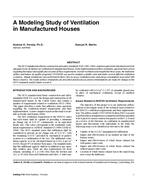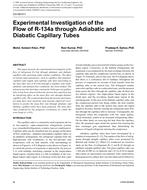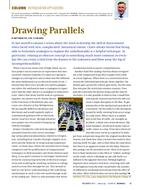This paper presents a summary of the findings of an ASHRAE-sponsored project to establish the deleterious effects associated with noncondensible gases in the vapor of a shell-side refrigerant condenser. The program work includes data taken on an 879-kW (250-ton) R-11 chiller and the development of a predictive model to define the effect of the noncondensible on the condenser performance.
The experimental work included injection of noncondensible gas (carbon dioxide or nitrogen) into the condenser and measuring the resulting gas-side heat-transfer coefficient. These measurements were taken for noncondensible concentrations up to 8% by volume. In addition, gas samples were withdrawn from eight positions along the length and around the circumference of the condenser shell ; these samples were analyzed by a gas chromatograph to establish the local concentration of noncondensibles. The data were reduced to define the effective gas-side resistance associated with the noncondensible. Data were taken to establish the power penalty caused by moderate concentrations of noncondensible gases, which was found to be in the order of 5%. A computer program was developed to solve the applicable heat and mass transfer equations (the Colburn-Hougen equation), which define the condenser performance with noncondensibles, and these equations were solved on a row-by-row basis for two assumed distributions of noncondensibles. A one-dimensional model assuming uniform noncondensible distribution predicted the condenser load within -5 to +27%. A two-dimensional model., which uses an axial distribution of noncondensibles, predicted the load within -.3 to +14%. The smallest errors occur at the rated load. The axial gas distribution used in the two-dimensional model was based on that measured with the sampling probes. Predictions of the gas-side resistance were made for R-11, R-22 and R-113 systems with air as the noncondensible gas.
Product Details
- Published:
- 1982
- Number of Pages:
- 15
- File Size:
- 1 file , 1.1 MB
- Product Code(s):
- D-TO-2709
- Note:
- This product is unavailable in Russia, Belarus


